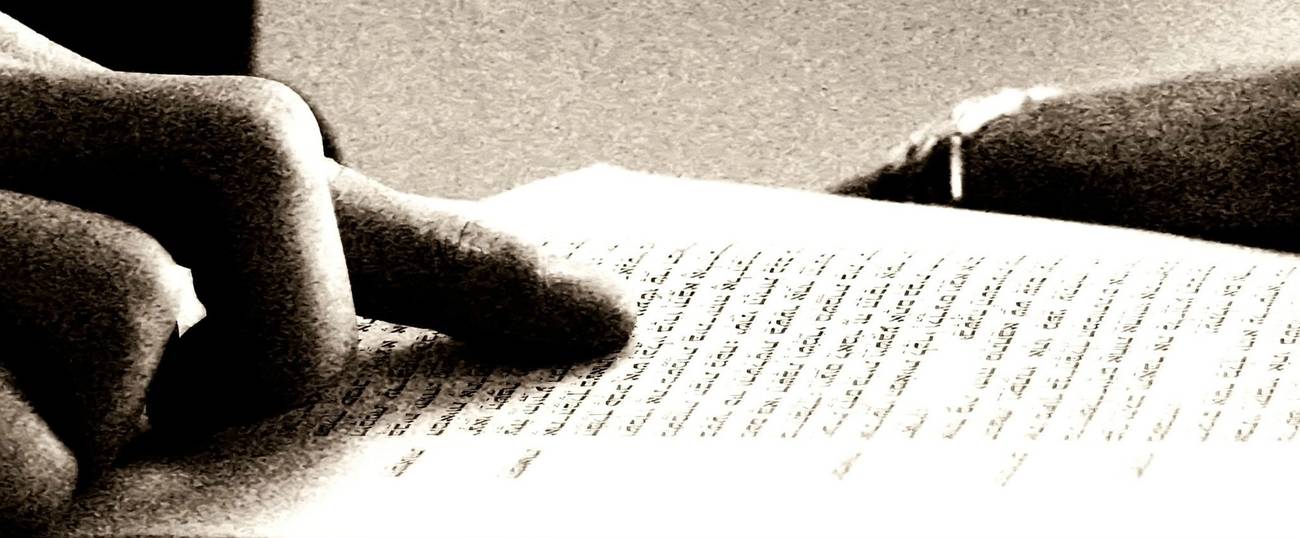Fear of The Book, and My Path to Academe
As a boy, I feared dropping the Torah scrolls, or writing marginalia in other texts. But I overcame that anxiety once I entered academe, whose doors were opened by great Jewish thinkers before my time




Editor’s note: Every day this week, The Scroll will publish a memory relating to an experience in Jewish education, in honor of those wonderful kids in our lives who are heading back to school, back to where it all begins, for better or worse. Today’s column is the last in the series.
I was a bookish lad, reading at an early age. Books, not toys, were my first favorites, and I owe some of my adult bookishness to the Torah. I followed the path of least resistance: I stayed in school because I was in good in school. I went from being the secular equivalent of a yeshiva bocher—in suburban Philadelphia public schools and then in college—to becoming a university professor of literature. Had my Conservative Philadelphia shul been more than a holding pen for us junior high school kids preparing for our bar mitzvahs; had there been any serious intellectual activity going on; had I learned to read the scripture closely, or to analyze the Bible, and to study the commentaries, I might have stuck with my religious education. No chance.

And yet, despite my love of books, I was also afraid of them. I was, literally, timid in their presence.
In high school, I was barely able to crack the spine of a paperback. Writing marginalia was all but unimaginable to me. I feared to hurt or rough up a book’s pristine pages. By the time I got to college, when writing in a book seemed mandatory as well as helpful, I made marks in a spidery hand, with pencil for the most part, instead of ink. I couldn’t bring myself to interfere with the words of the masters I was theoretically absorbing through eye and mind.
Why should a bookish child have this fear? At my synagogue, I got into my bones a feeling for the sacred nature of all books because of the ubiquitous veneration of the book: the Torah. When the scrolls were taken from the ark during Shabbos services, when the text was marched up and down the aisles, when men kissed the scroll not directly but by reverently placing the fringes of their prayer shawls onto the scroll, I felt a tremor. Consequently, I began to feel reverence for all books.
And when our Hebrew School teachers—mostly old men with thick accents, recent immigrants who taught us kids our bar mitzvah portions—explained to us the holiness of scripture, they were not speaking metaphorically but literally. Who was it—the cantor, the teacher, the rabbi himself?—who wagged his finger and told us that to drop the Torah was a mortal sin, I cannot remember. But I do remember the fear of falling into some Jewish version of hell were I ever to miss a step and tumble with the Torah in my hands. At my bar mitzvah I had no problem with the memorized portions I had to chant. What made my 13-year-old self tremble was the anxiety that I might literally die and be damned if I ever dropped the scrolls.
Getting a doctorate in English literature was much easier: Once I realized that a printed book was not sacred, that it was replaceable, I got to breathe a sigh of relief. I was not alone. One or two generations removed from their shtetls, other American Jewish intellectuals took it upon themselves to enter the secular groves of academe. After Harry Levin (Harvard) and Lionel Trilling (Columbia) broke the unwritten gentlemen’s agreement that only WASPs or otherwise believing Christians could instruct mostly white, preppy boys in the niceties as well as the ideas behind literary texts (Chaucer, Shakespeare, Milton and their descendants), Jews entered the sacred precincts of the Ivy League.
Learning, it has long been said, is one pillar of Yiddishkeit. We are Am HaSefer, the people of the book. I changed one kind of book for another. But my own love of reading, my pleasure in the habits of textual analysis, my reverence for all writing has a lot to do with the lessons I learned, and others I turned away from, in my mid-century, watered-down Jewish training.
Previous: Rebellion at the Mechizta
Willard Spiegelman is the Hughes Professor of English, emeritus, at SMU in Dallas, the author of a dozen books, and a longtime contributor to the Leisure & Arts pages of the Wall Street Journal.